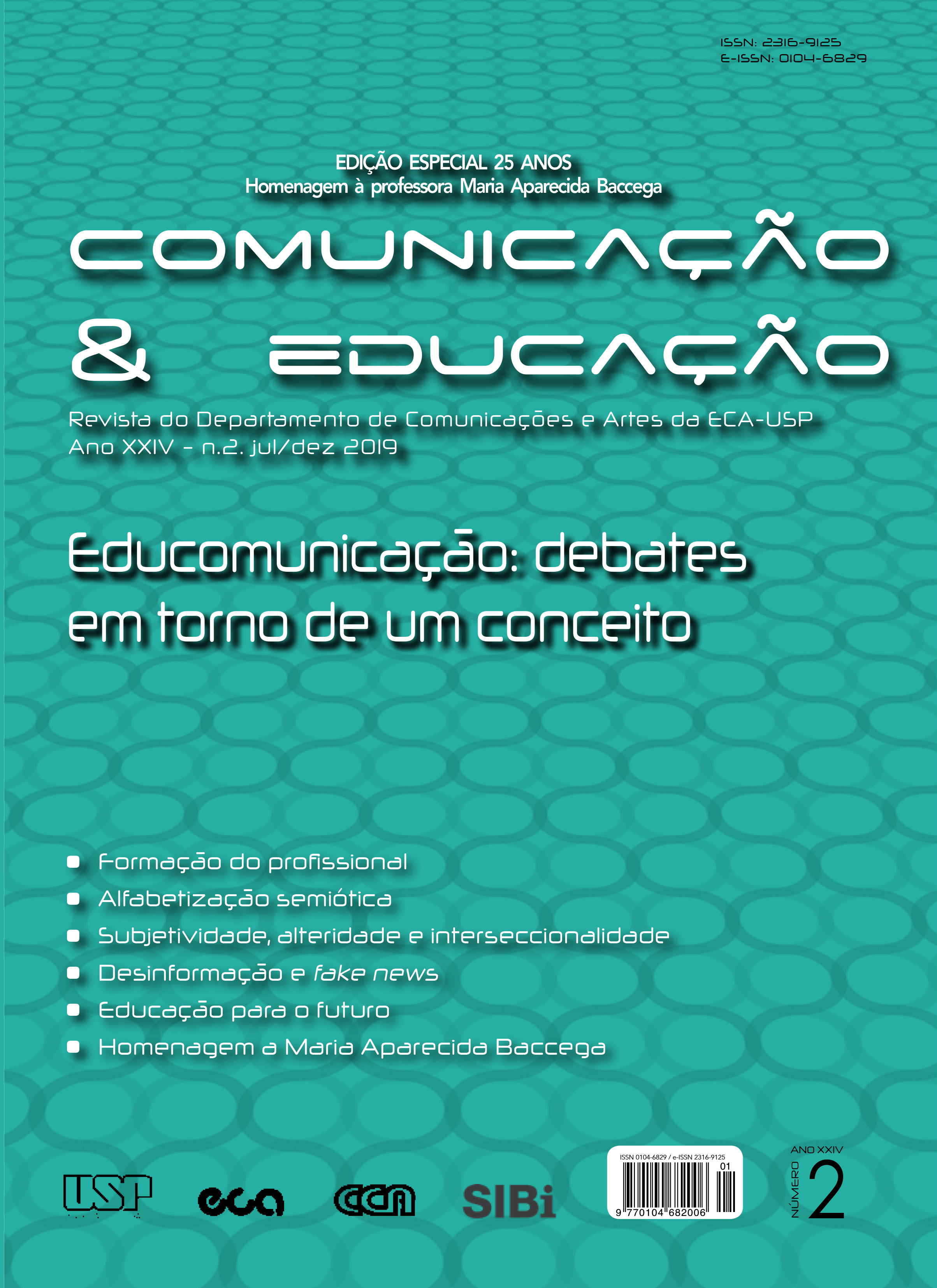Semiotic literacy with internet digital codes
DOI:
https://doi.org/10.11606/issn.2316-9125.v24i2p38-53Keywords:
semiotic literacy, digital codes, internet, technoculture, self-referentialityAbstract
In this article, we address the socio-technical changes in contemporary times by a historical approach arising from the introduction of internet in the culture. Subsequently, we investigated the importance of knowledge of digital codes in this context. We formulated the hypothesis that it is necessary to face the complexity of understanding the technical infrastructure of the network so that we can educate citizens, and not users, who consume all sorts of codes from complex and constant coding and recoding dynamics, without the proper semiotic competence for the critical interpretation based on the selfreferentiality that language imposes on us in this new historical framework. As a conclusion, we assume that there is a need for a literacy project that includes the understanding of the use of codes in communication.
Downloads
References
BENJAMIN, Walter. A obra de arte na era de sua reprodutibilidade técnica. In: BENAJMIN, Walter. Sobre arte, técnica e política. Lisboa: Relógio D’Água, 1992. p. 71 113.
CAMPOS, Augusto de. Paul Valéry: a serpente e o pensar. São Paulo: Brasiliense, 1984.
BETTETINI, Gianfranco. Las ambigüedades del sujeto informador. BETTETINI, Gianfranco. La conversación audiovisual. Madrid: Cátedra, 1996. p. 63-70.
COLOMBO, Fausto. El ícono ético: la imagen de síntesis y un nuevo paradigma moral. In: TALENS, Jenaro (dir.). Videoculturas de fin de siglo. Madrid: Cátedra, 1990. p. 145 156.
DOG-whistle politics. In: WIKIPEDIA: the free encyclopedia. [San Francisco, CA: Wikimedia Foundation, 20--]. Disponível em: https://en.wikipedia.org/wiki/Dog-whistle_politics. Acesso em: 20 nov. 2019.
ECO, Umberto. Guerrilha semiológica. In: ECO, Umberto. Viagem na irrealidade cotidiana. Rio de Janeiro: Nova Fronteira, 1984. p. 65-75.
ENGELS, Friedrich. Humanização do macaco pelo trabalho. In: ENGELS, Friedrich. A dialética da natureza. Rio de Janeiro: Paz e Terra, 1979.
FAUSTO NETO, Antônio. Enunciação, auto-referencialidade e incompletude. Revista FAMECOS, Porto Alegre, v. 14, n. 34, p. 78-85, 2007.
FOUCAULT, Michel. Isto não é um cachimbo. Rio de Janeiro: Paz e Terra, 1988.
FOUCAULT, Michel. Nascimento da biopolítica. Lisboa: Edições 70, 2010.
GALLOWAY, Alexander. Protocol: how control exists after decentralization. Massachusetts: The MIT Press, 2004.
HALL, Stuart. Codificação/decodificação. In: HALL, Stuart; SOVIK, Liv (org.). Da diáspora: identidades e mediações culturais. Belo Horizonte: Editora UFMG, 2006. p. 365-381.
HAN, Byung-Chul. Sociedade da transparência. Petrópolis: Vozes, 2017a.
HAN, Byung-Chul. Sociedade do cansaço. Petrópolis: Vozes, 2017b.
HAN, Byung-Chul. Topologia da violência. Petrópolis: Vozes, 2017c.
HERN, Alex. Revealed: how TikTok censors videos that do not please Beijing. The Guardian, London, 25 set. 2019. Disponível em: https://www.theguardian.com/technology/2019/sep/25/revealed-how-tiktok-censors-videos-that-do-not-please-beijing. Acesso em: 14 out. 2019.
HISTORY. In: TOR Project. Seattle: The Tor Project, 2011. Disponível em: https://www.torproject.org/about/history/. Acesso em: 27 dez. 2019.
HOFSTADTER, Douglas. Godel, Escher, Bach: an eternal golden braid. New York: Basic Books, 1979.
JAKOBSON, Roman. Linguística e poética. In: JAKOBSON, Roman. Linguística e comunicação. São Paulo: Cultrix, 1971. p. 118-162.
LINGUAGEM assembly. In: WIKIPÉDIA: a enciclopédia livre. [San Francisco, CA: Wikimedia Foundation, 2016]. Disponível em: http://pt.wikipedia.org/wiki/Assembly. Acesso em: 25 out. 2010.
LOTMAN, Iuri. A estrutura do texto artístico. Lisboa: Estampa, 1978.
LOTMAN, Juri. The unpredictable workings of culture. Tallinn: Tallinn University Press, 2013.
MANOVICH, Lev. Database as symbolic form. Convergence, Thousand Oaks, v. 5, n. 2, p. 81-99, 1999. Disponível em: http://con.sagepub.com/content/5/2/80. Acesso em: 5 maio 2019.
MATURANA, Humberto. Emociones y lenguaje en educación y política. Santiago: Dolmen, 1997.
MATURANA, Humberto; VARELA, Francisco. A árvore do conhecimento: as bases biológicas do entendimento humano. Campinas: Psy, 1995.
MCLUHAN, Marshall; FIORE, Quentin. O meio são as massagens: um inventário de efeitos. Rio de Janeiro: Record, 1969.
MORIN, Edgar. O ano zero da Alemanha. Porto Alegre: Sulina, 2009.
PÉREZ, Ignacio. El rol de los proxies y protocolos en la investigación de malware. We live security, Buenos Aires, 29 maio 2015. Disponível em: https://www.welivesecurity.com/la-es/2015/05/29/proxies-y-protocolos-investigacion-malware/. Acesso em: 15 nov. 2019.
PRIGOGINE, Ilya; STENGERS, Isabelle. A nova aliança. 3. ed. Brasília, DF: Editora UnB, 1997.
SHIRKY, Clay. Lá vem todo mundo: o poder de organizar sem organizações. Rio de Janeiro: Zahar, 2011.
THACKER, Eugene. Foreword: protocol is as protocol does. In: GALLOWAY, Alexander. Protocol: how control exists after decentralization. Massachusetts: The MIT Press, 2004. p. XI XXIV.
TIM Berners-Lee. In: WIKIPÉDIA: a enciclopédia livre. [San Francisco, CA: Wikimedia Foundation, 20--]. Disponível em: https://pt.wikipedia.org/wiki/Tim_Berners-Lee. Acesso em: 20 nov. 2019.
VOLLI, Ugo. Factoides y mnemos: por una ecología semiótica. In: TALENS, Jenaro (dir.). Videoculturas de fin de siglo. Madrid: Cátedra, 1990. p. 129-135.
WIENER, Anna. The complicated legacy of Stewart Brand’s “Whole Earth Catalog”. The New Yorker, New York, 16 nov. 2018. Letter from Silicon Valley. Disponível em: https://wwuw.newyorker.com/news/letter-from-silicon-valley/the-complicated-legacy-of-stewart-brands-whole-earth-catalog. Acesso em: 15 nov. 2019.
Downloads
Published
Issue
Section
License
I authorize the publication of the submitted article and soon the copyrights to the magazine, in the printed and electronic version, if it is approved after the evaluation of the reviewers.
I understand that readers may use this article without prior request, provided the source and authorship are mentioned. Readers are not authorized to use this article for reproduction, in whole or in part, for commercial purposes.

































